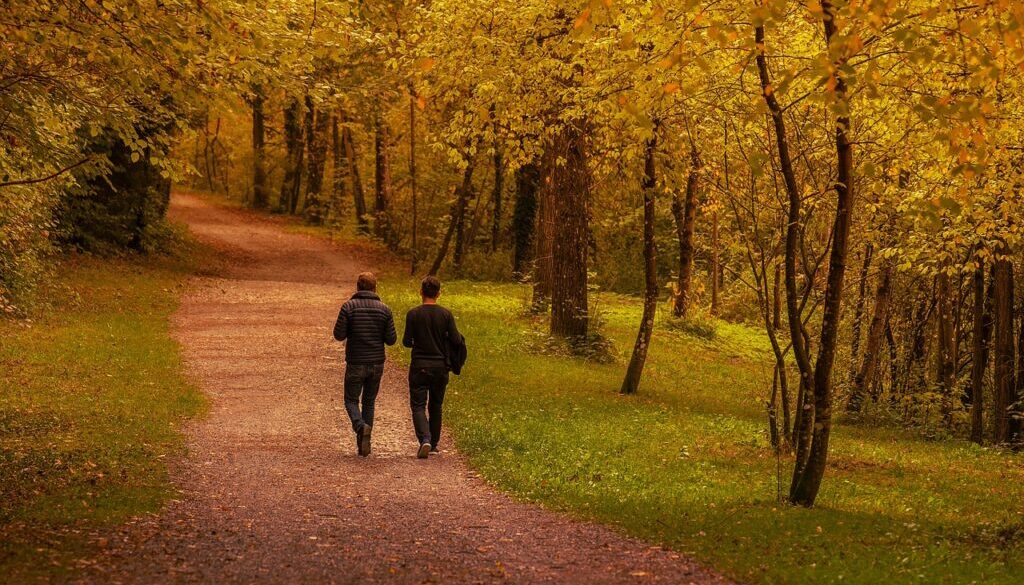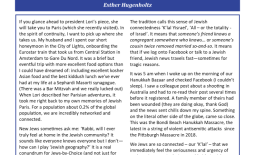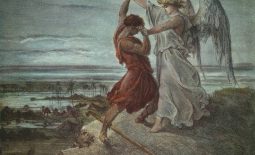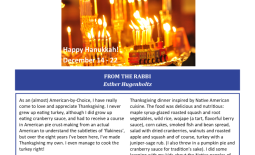Let There Be No Strife Between You and Me
The story-telling element in our Jewish culture is so compelling, worlds of the heart bound in words, each story a gem in a jewel box. During moments of great joy or deep sorrow, we look into our collective soul and glimpse our gems, weigh them in our hands, survey their angles and luster.
Like many of you, I carry stories about the land which we call Israel and Palestine. Our stories are drawn up within its borders but also transcend beyond. We walk this land, ‘the length and breadth of it’, as this week’s portion has it. We bear witness to it; its singular beauty and its bitter scars. We position ourselves in relation to it: before it, within it. We love it and struggle with it; a web of contradictions, a veil of intimacy draped across it. This land invites the telling of stories.
I visited Israel for the first time when I was 17 years old. I had won a European Union-wide youth essay writing prize, issued by the EU and UNESCO, on the topic of ’50 Years of the Holocaust – the Lessons for Europe.’
I grew up in a liberal Zionist home. In post-War Netherlands, many gentiles identified strongly with Israel. My mother had been there several times, even managing to get trapped there for a while when the Six Day War erupted in 1967. I grew up with travel guides gracing our coffee table, advertising working summers at Kibbutzim. I wanted that too, the passionate dream of a young teenager. I spent almost a month travelling with my family in Israel, coast to coast, top to tail, even visiting the Golan Heights, the West Bank and Petra in Jordan. This trip became a collection of gems in my jewel box. Some of them were lustrous and bright; others had sharp, jagged edges.
I returned again and again, coming home to my people: on youth trips, yeshiva programs and for rabbinical studies. My last visit was in 2013, six months pregnant with my oldest child. One of my most enduring memories was a rabbinical school visit in 2011. I wanted to daven at haKotel ha’Ma’aravi – the Western Wall – and dressed modestly for the occasion, looking indistinguishable from Dati Le’umi women, the Orthodox ‘National-Religious’ demographic. This made me uneasy because I do not share their religious values.
We picked our way through the Palestinian part of East Jerusalem and it was a scorching July afternoon during Ramadan. A Muslim vendor was selling limonana, a popular local mint-lemonade drink. I felt some remorse enjoying the refreshing beverage while thousands of people around me were fasting. I bought the drink and the vendor, out of the goodness of his heart, gave my friend (who accompanied me) a second, free drink. We thanked the gentleman and continued picking our way through the narrow, golden streets of the Old City. I met the friendly gaze of a Palestinian woman who smiled at me. ‘Cham’, she said in aspirated Arabic and I immediately understood, because this is also the word for ‘hot’ in Hebrew, cham. We shared a simple human connection and I wished her Ramadan Mubarak.
My many stories from Israel are littered with such human connections. An Israeli-Russian bus driver who marvelled to see a woman pray with tefillin and gave me a thumbs up. Encounters buying flowers for my host for Shabbat from flirty Jewish street vendors on a Friday afternoon, hearing the ubiquitous ‘Shabbat shalom’. Hanging out with secular young Israelis on the beaches of Tel Aviv. Enjoying creamy Palestinian hummus with an Israeli friend in the Abu Gosh village (world recorder holder for the best hummus, allegedly). Banter with the Bitachon (security) people at Ben Gurion airport (‘what do you mean you are a female rabbi? And you haven’t even had a Bat Mitzvah!’).
We carry our gems close to our hearts. We have Israeli family, friends, colleagues and loved ones in the region. In my pastoral check-in’s with congregants these past weeks, I have been privileged to hear so many moving stories of loved ones in Israel or on their way there to offer medical aid. Doctors, nurses, cousins, siblings, children. WhatsApp messages and email updates from a faraway land that feels so close;. I hold our stories, beautiful, complex, complicated, as tenderly and lovingly as any one rabbi can.
When I pondered what to preach on for this Shabbat, I felt overwhelmed by the choice of so much Torah: thick, dense, meaningful. Parashat Lech Lecha is one of my favorite parshiyot. I deeply identify with Avraham Avinu and Sarah Imeinu. There is much that resonates with as Jews; this text a repository replete with our highest values and greatest moral instincts. I could have chosen to preach a sermon on what it means to lead a Judaism by its vision; to lean into being a blessing to all, a maker of peace, a builder of hope. There are legion midrashim that conceive of Abraham and Sarah opening up their nascent community and extending welcome beneath the poles of their tent; making converts, relaying ethics. There is a midrash of our Patriarch witnessing a burning citadel, a metaphor for our world on fire.
Rather, I think we need to hear our stories first. Placing humanity before ideology, emphasizing vulnerability in our values. We cannot control the Big Things; not even by storming the gates of Heaven; not by tweet nor Instagram post, op-ed or Facebook update. Not by news report and opinion-piece, documentaries and podcasts dripping with political analysis. There is a time and place for that. But in this sacred space, held by holy community, it is the gems of our human stories that cast light in the darkness.
In the middle of the Torah portion, tensions rise between Lot and Abraham. Lot is an ersatz Abraham; he is a follower rather than a leader, a bystander, not an upstander. Like his uncle, he has amassed resources and wealth; yet he has not calibrated his moral compass to the degree Abraham has. The Torah tells us that in order to stave off conflict between both parties and their large retinues and flocks, Abraham gives Lot first choice to new grazing lands, despite the Patriarch wielding more power, authority and seniority. ‘El na tehi merivah beini uveinecha… ki anashim achim anachnu’, Abraham tenderly states: ‘Please now, let there be no strife between me and between you, for we are kinsmen’ (literally: ‘brothers’). Gen. 13:8
Lot settles in the plain of Zoar, amongst Sodom and Gomorrah, a land so fertile, abundant and beautiful that the Torah calls it ‘Gan Adonai’, the Garden of the Eternal. Perhaps the ability to name tension and sit with it, to keep moral agency, to lead with principle rather than politics, the call to hear ‘the other’, is what creates the gift of expansive abundance in our lives, a garden of Divinity.
This one line in the Torah can launch a thousand sermons. I am struck how Abraham doesn’t say ‘let there be no strife between us’ but rather says ‘between myself me and you.’ He has the humility and the sensitivity to reflect on his own actions instead of deflecting responsibility to the other.
I am struck by the narrative: two men who found a way to tell of their lives and walk the breadth and beauty of this land. Who held each other’s humanity at the core of their moral imagination.
‘Cham’, the Palestinian woman said to me kindly. The shared experience of Middle Eastern heat. I am reminded that in next week’s portion, Abraham sits ‘kechom yahom’, in the ‘heat of the day’ awaiting to entertain angels. We are sitting in the heat of our own days; scorching, parching, difficult. On our skin, we feel the jagged edges of our gems; the glint of complex beauty, a hint of color among the black.
Please, let’s keep telling each other our stories. Stories of those killed; stories of those still taken hostage; stories of impending loss and of the momentum of grief; a grief of the land and yet transcending it. Let’s also tell stories of what we can protect, save, cherish, rebuild. Stories of this land and its humans, stretching back into a primordial past, the rhythm of our words falling to the beat of sandaled feet. And please God, we will tell a new story and sing a new song. Let the moment be near, may the time be now for us to tell a story of our common dignity, our shared humanity and of days of peace.
Please, God, may that be Your will and ours.




